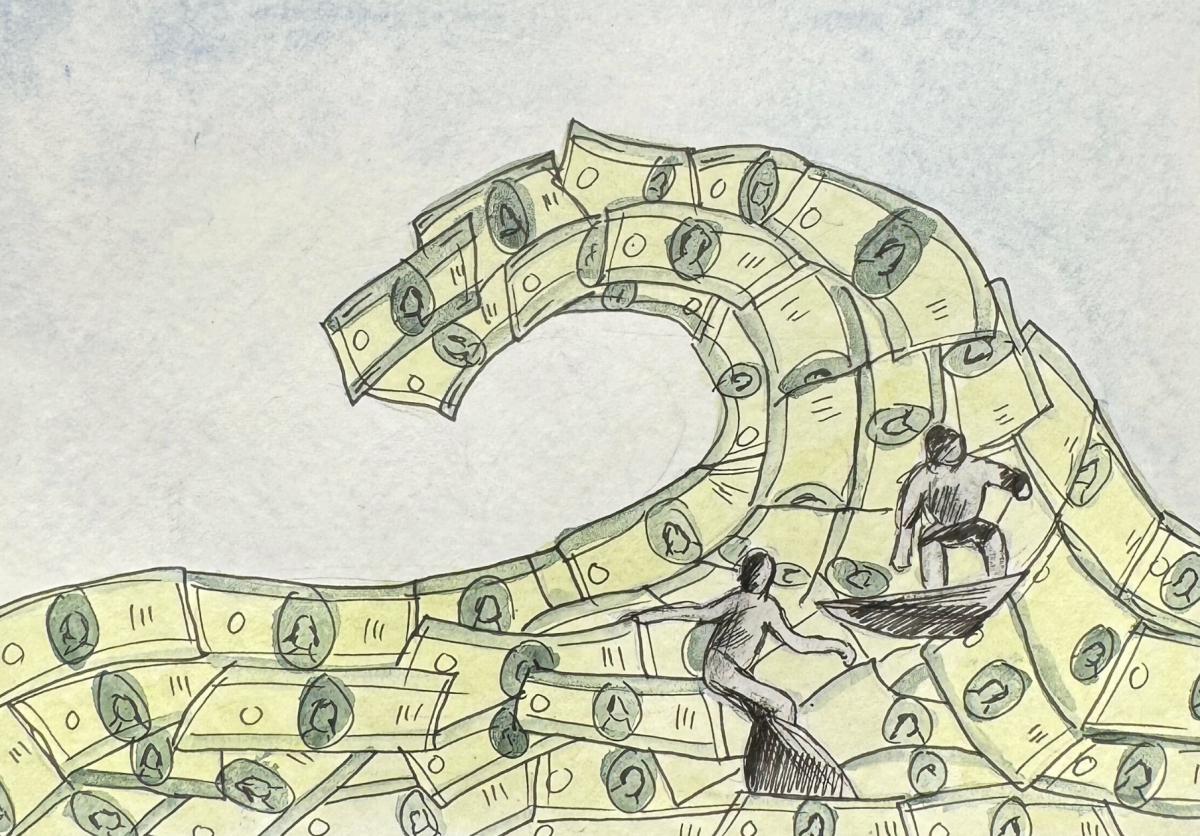
Lauren Beck/The Hoya

“Point Break” is the perfect movie to watch with people who like to ask questions, especially questions like: “What would a surfing movie look like with Keanu Reeves and Patrick Swayze?” It would — and does — look beautiful.
The film follows the action-packed adventure of Johnny Utah (Keanu Reeves), former Ohio State University quarterback and newly minted FBI agent tasked with investigating a tightly-knit group of bank robbers and suspected surfers. It is a story of risk, thrill and how mentorship builds complex relationships.
Utah, paired with the experienced Agent Angelo Pappas (Gary Busey), must act on Pappas’ hunch that the ex-presidents, bank robbers who conceal their identities with rubber masks of former commanders in chief, are actually surfers. To further the investigation, Utah goes undercover in the Los Angeles, Calif., surfer community, where he meets Tyler (Lori Petty). Through Tyler’s surfing lessons, Utah also gets to know Bodhi (Patrick Swayze), who is searching for “the ultimate ride.”
After learning how to surf (and growing to love the sport and the people who do it), Utah gets closer to Bodhi’s squad — eventually realizing that his new mentor is one of the ex-presidents himself. The ex-presidents go after another bank and are confronted by Utah and Pappas: Car chases, foot chases and shootouts ensue. Utah’s relationship with the surfers grows in legal and moral complexity as he and Bodhi try to abide by the latter’s unsaid no-killing policy in increasingly fraught standoffs. Nonetheless, this policy and their relationship ultimately fails, resulting in desperation and disillusionment.
“Point Break” touches on several more thoughtful questions, not least of which is what it means to live well. Bodhi and his crew subscribe to the philosophy of thrill-seeking to both lose and find one’s self, regardless of the cost. Bodhi sees life as a game, in stark contrast to Utah’s concentrated missions and targets. However, as Bodhi’s game breaks down and he stops following his own rules, his moral standards crumple, culminating in a scene where he leaves his partner’s cold body but returns for the backpack of money the man wore while going down with him. Bodhi’s laid-back charm runs dry once he cannot stop his friends’ deaths, a note that “fighting against the system” is a romantic notion that does not dispel reality, only postponing the inevitability of man losing against the law of man or the law of nature.
The movie is filled with humorous exchanges, including quips that instructors delight in sharing. By-the-book analysts claim to be “crunching data,” surfers promise that the sport will “change your life” and cheeky skydiving instructors rhetorically ask, “You’re about to jump out of a perfectly good airplane — how do you feel about that?” While these scenes unfold, the lyrics in the background cheerily and ominously chant, “I will not fall, I will not fall.” Inevitably, Utah, like any good protagonist, falls. His data-lacking “hunch” about a disagreeable bunch of surfers leads to the first deaths in the movie, surfing envelops his life as he joins the ex-presidents’ group and he narrowly avoids a sky jump gone wrong, reaggravating his old football knee injury.
Of course, the camera work is exquisite. The powerful surf rolls in, stretching the wide screen even further as viewers take in the coast. Skydiving scenes are shot with a wingsuit pilot from the same Twin Otter plane from which the actors jump, allowing the audience to soar along with the ex-presidents and their newest coerced FBI recruit. Emotions flood in with the colors as the vibrant blues and yellows of the California coast contrast with the killjoy corporate grays of interiors and buildings. The surf only darkens at the end, as Bodhi faces his demise in the shape of hell and high water.
Takeaways after watching are grim, considering the recent high adventure experienced the thrills of controlled falling through sea and sky. And yet, interpersonal trust, an effort against perpetuating death through violence and incredible rides on waves and parachutes ring clearly in the viewer’s recall. One of the ex-presidents quotes “The Life You Save May Be Your Own” as they exchange parachute packs in the plane, alluding to the corruption, lost innocence and complicity in our own errors: Thrill-seeking “is the closest you’ll ever get to God”.
If so, how does it compare to our value of money, social paradigms of justice and human life? For, even after Utah spends months chasing down Bodhi once more, when the latter asks the former if he still surfs, Utah only has one thing to say: “Every day.”